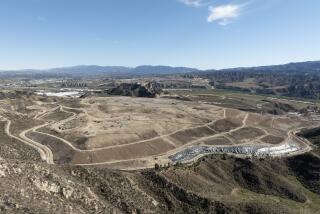Liability Trial Begins Over Stringfellow Toxic Dump
- Share via
Lawyers for a group of companies already liable for the cleanup of the Stringfellow hazardous waste dump argued in Los Angeles federal court on Wednesday that the state should help pay for the job that could cost $600 million and take more than 50 years to complete.
The argument came on the first day of a federal jury trial to determine potential state liability in the cleanup. The case was brought against the state by 18 companies, including Rockwell International Corp., General Electric Co. and McDonnell Douglas Corp., and dump owner James Stringfellow.
“The state located it, designed it, supervised its construction and approved it,” said Chris Bisgaard, the attorney representing Stringfellow.
State and federal authorities earlier filed suit against the dump’s owner and largest waste generators to have them pay for cleanup at the site.
Length of Service
Stringfellow, which opened in 1956, was closed in 1972 after an estimated 34 million gallons of acids, pesticides, solvents and toxic metals were dumped at the Pyrite Canyon site near the Riverside County community of Glen Avon. Stringfellow has been labeled one of the worst hazardous waste dumps in the nation.
Bisgaard alleged that state geologists erroneously determined in 1955 that Stringfellow’s old granite quarry was located above an impermeable granite bedrock suitable for safe dumping of toxic wastes.
In addition, “Stringfellow was pressured into opening the site,” Bisgaard said in an interview. “California officials told him it was an ideal location (for a waste site). As a matter of fact, they were wrong.”
State health officials now believe that toxic substances dumped in the quarry over the years have spread underground and contaminated portions of Glen Avon’s underground water supply.
State’s Position
But Barbara Noble, a deputy attorney general representing the state, told the jury that the state has always performed its functions in accordance with existing statutes and should not be held liable for cleanup costs.
“The responsibility in this case lies with Mr. Stringfellow, the (waste) generators and the operators and not with the state of California,” Noble told the jury.
More to Read
Sign up for Essential California
The most important California stories and recommendations in your inbox every morning.
You may occasionally receive promotional content from the Los Angeles Times.











